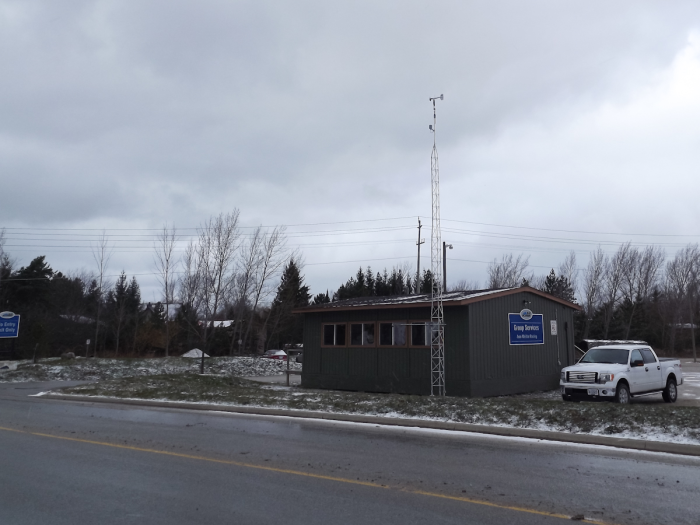



The primary purpose of the weather installation at Blue Mountain Resorts is for marketing and sales. The project is quite different from most of the weather station installations done by Campbell Scientific which tend to be for academic, scientific, industrial or government monitoring of weather observations.
The Problem – Representative Weather Monitoring for Skiers
The nearest “official” government weather station to Blue Mountain is located at the Collingwood Ship Yards. This harkens back to when Collingwood was a ship building port on the Great Lakes. The weather station is located at the end of a pier, surrounded by the waters of Georgian Bay. The problem with this location as an official weather observing site, is that the surrounding water influences the temperature, especially in the late fall and early summer.
When potential skiers from Toronto and other Southern Ontario communities check on the weather at Blue Mountain either from Blue Mountain’s own web site or from other web sites such as The Weather Network or Environment Canada, the station at the Collingwood Ship Piers (WCU) is used to generate the observations. During early December, the observation can frequently report +4⁰C and rain, while it could well be -3⁰C with snow further inland and higher in elevation at Blue Mountain. During the early summer, the observations are reversed and the Collingwood station could report a cool day of +10⁰C with a wind-chill off the lake, when it might be a temperature of +20⁰C and a nice day for golfing at Blue Mountain’s Monterra Golf Course. These weather observations would have led to some skiers and golfers cancelling planned trips to the resort, resulting in lost revenue.
Blue Mountain Market Area
In the North American context, Blue Mountain does not have the vertical terrain of the Western Rockies, but what it does have is a major market area of 5.5 million population within a two hour driving time for day trips in the Greater Toronto Area. There is an even greater market population for overnight stays within a five hour driving distance which includes American cities such as Detroit and Cleveland. This has resulted in Blue Mountain becoming a popular year round resort with 15 ski lifts and a capacity for 21,690 skiers per hour. The significance of the large market within driving range, is that skiers check their favourite app, web site or tv station before making the trip to check the latest conditions. Blue Mountain would like to make sure they are getting the most accurate and reliable information to avoid lost revenue.
The Solution – A Dedicated Weather Station
The resort decided to install its own weather station to provide more representative weather observations. The weather sensors initially installed are air temperature, relative humidity, wind speed and direction, snow depth and air pressure. For considerations of security, proximity to power, Ethernet access, and a protected area (in this highly public area), the weather station was installed immediately adjacent to the Group Services building at the south end of the resort. This is at the base of the ski terrain. Blue Mountain has different climate zones at the base and summit of the resort, and ultimately, it would be best to install multiple instrumentation sites to provide potential skiers with these additional observations. Blue Mountain views the installation at the base as the first step in more representative reporting of resort weather conditions.
Non-standard Installation Considerations
Since the weather station was installed close to the Group Services building and adjacent to bus parking, the influence of warming from the building or from bus exhaust was considered. It was therefore decided to install the temperature sensor at the top of the 10 meter tower at the same height as the anemometer. As noted, a second air temperature sensor will eventually be added at the summit of the resort. The snow depth sensor was installed on a cross-arm off the tower. This is within 3 meters of the adjacent roadway and will likely be affected by snow plow operations. The resort decided to try this out for the first winter season. At a future point, it will likely be relocated with a RF repeater to a slope-side location to avoid effects from road maintenance.
Climate Change Monitoring
David Phillips, Senior Climatologist for Environment Canada has predicted the demise of smaller ski operators in Ontario with the impact of global warming. As the largest ski resort in Ontario, and with its
superior snowmaking, Blue Mountain will be able to continue offering winter activities no matter what the weather. The long-term climate data archived from the weather station will enable management staff to better plan snowmaking activities and winter operations.
Case Study Summary
Application
Year round resort weather monitoringLocation
Blue Mountain Resorts, ON CanadaContributors
Robert Boggs, Eric Courtin, and Greg Kalmbach of Campbell Scientific CanadaParticipating Organizations
Blue Mountain ResortsMeasured Parameters
Air temperature, wind speed & direction, relative humidity, air pressure, snow depth.View the PDF